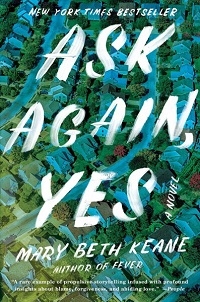
Although novelist Mary Beth Keane received strong reviews for her previous publications, The Walking People (2009) and Fever (2013), her third, most recent novel, Ask Again, Yes (2019), is considered by many to be her breakout book, having received high accolades from critics, readers, and book clubs alike. Ask Again, Yes was also chosen to be The Tonight Show’s Summer Reads pick in 2019; Keane appeared on the show to chat about the novel with host Jimmy Fallon. The rest is bestseller history.
I didn’t know any of this when I first listened to the novel via Overdrive/Libby in 2019, but I was instantly engrossed in the story, which spans the lives of two couples and their kids across approximately four decades. Keane has said that Ask Again, Yes is a kind of Romeo and Juliet tale—houses are definitely divided—essentially exploring the ways in which things that happen to us as children continue to matter when we’re grown. The immigrant experience, specifically the experience of Irish immigrants, is featured in the novel as well. But while I have to agree with Keane’s summary—who better knows what a book is about than its author, right?— it was the tender and profound exploration of forgiveness and redemption in the wake of literal and metaphorical wounds and absences so long they might be considered abandonment that impacted me most.
I say this only in retrospect. During my first reading, and to a lesser degree during my second for WPL’s Fiction Book Discussion, I was less focused on the book’s themes and more captivated by the interior lives of the complicated characters, the beauty of Keane’s style, sustained, but subtly altered as she seamlessly shifts points of view, the twists and turns of the plot. The book opens in 1973 “in the worst neighborhood of the best-known city in the world” (the Bronx, New York City), with two male rookie cops launching their careers by intervening in a shooting. This situation sets the stage for much of the drama to come: the cops will become husbands, fathers, and next-door neighbors in a working class, suburban neighborhood; the women in their lives, wives, mothers, and neighbors as well.
If this sounds neat and tidy, it isn’t. Kids come along, mutual attraction between two of the kids, Peter and Kate, kicks in. One of the men struggles with alcoholism, one of the women with her mental and emotional health. Things get messier from there—at times, terribly, even tragically so, particularly in the case of the character Anne, whose mental health challenges only increase as the novel propels its way forward. Anne is no caricature of mental illness, however; she is anything but one dimensional or static. Living with her on the page, getting into her skin, so to speak, was one of the most vivid and moving reading experiences I’ve had in recent years.
I’m grateful to Keane for developing Anne, along with other characters, as she did. They break, they are broken, they mend, flaws still evident, at risk of breaking again. In the end, their experiences afforded me a deeper understanding of myself, the world in which I live, the people I know and love. I would highly recommend Ask Again, Yes, for its rendering of what it means to build and rebuild identity, as well as connection and community, against all odds.